By JULIE MINDA
Mass shootings at a grade school, a grocery and a Fourth of July parade have left people across the U.S. feeling despondent and unsafe. Especially given that one such rampage happened in a medical office building at Saint Francis Hospital in Tulsa, Oklahoma, in late spring, ministry leaders are asking what more can be done to protect patients and staff not only from the unpredictable savagery of mass shootings which are extremely rare in health facilities, but also from the increasingly common threats and physical assaults against health care staff.
An ongoing focus is on ensuring employees have an awareness of potential threats and an understanding of how to respond if there is an attack.
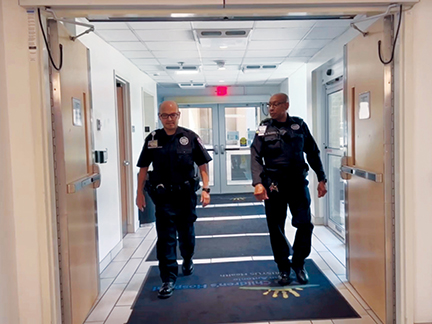
Laura Dewey directs emergency management and safety for the five-hospital Catholic Health system in Buffalo, New York. In a racist attack May 14, a gunman killed 10 Black shoppers and employees at a Buffalo grocery store. Dewey said, "As an organization, we are continually evaluating and assessing for top hazards and always strive to be proactive rather than reactive. However, having a mass shooting right in our own community accelerates certain conversations. People (including staff) are concerned, and in some cases scared. It is our job to respond to that."
Catholic Health recently refreshed its active shooter drill training with all employees, including by providing them with a video on how to increase chances of survival.
Decline in civility
Dewey said, "Due to the recent events locally and nationally, active shooter preparedness and response has certainly become a larger focus, but we are working to keep our perspective broad. Acts of violence —
both verbal and physical — against health care workers have increased dramatically in recent years. These incidents are not limited to devastating, headliner events such as mass shootings."
According to the Occupational Safety and Health Administration, 75% of nearly 25,000 workplace assaults reported annually occurred in health care and social service settings.

Roy E. Alston is vice president of security for the 36-hospital CHRISTUS Health, which has U.S hospitals and outpatient facilities in Texas, New Mexico and Louisiana. He said that as at many other hospitals across the U.S., CHRISTUS Health has seen an increase in assaults against staff and in visitors bringing firearms onto campuses, though CHRISTUS campuses bar guns. He said he cannot speculate on the reason for the increase in people bringing guns on hospital campuses.
Alston said aggression and all kinds of violence is on the uptick in health care settings in the U.S. and he believes a core contributor to that incivility is that the nation has failed to deal with gun violence and with drug addiction.
He also pointed to the necessity of de-escalating the agitation of drug-seeking patients. "Many of the people who come through our emergency departments or patients of pain management specialists might be exhibiting drug-seeking behavior, but that doesn't mean we shut down. We have to listen and respond. We must show them dignity and meet them in the place they are at the moment."
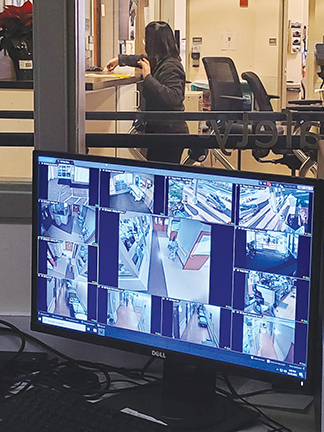
Matthew Towler is system vice president of facilities and construction administration at PeaceHealth, a 10-hospital system operating in the northwestern U.S. He said there has been an erosion of social restraint and comity. If patients are upset about something, they are more likely than in the past to express that through verbal aggression, which can escalate into assault.
No going back
Catholic Health's Dewey said, "There is no question that delivering care in 2022 is more challenging than it was in 2019, but we cannot go back in time. Risk factors for violence, such as unmet mental health needs and
substance abuse, are seen often in the health care setting and have escalated substantially."
Individuals with these risk factors "are entering our facilities every day and it is our responsibility to adapt," she said.
Alston agreed, "If we could solve the problem (of violence in society), that would be great, but the reality is that this is what is happening in our time, and our patients and associates and families expect to be safe in our facilities and we have to work to achieve that."
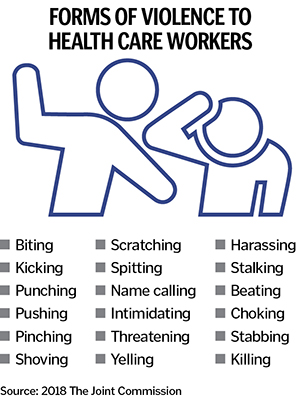
As is typical at health systems, Catholic Health, CHRISTUS and PeaceHealth assess security on an ongoing basis and conduct formal security assessments and planning at least annually. They evaluate whether metal detectors and sign-in procedures are warranted and used to screen all who enter their facilities. They evaluate security camera coverage. They assess staffing levels and capabilities of their facilities' security officers — CHRISTUS's security force is armed, PeaceHealth's is not.
They also rate risk and threat levels for each site. At PeaceHealth, said Towler, multiple factors impact the risk score for a campus location, including its trauma level, whether it has a dedicated adult behavioral health unit, emergency department volume, the number of behavioral health holds on average in the emergency department, the community crime rate, and its workplace violence rate.
Towler said the assessments and risk factor rankings inform changes in security protocols and investments.
Panic buttons
On Aug. 2, Ascension St. Vincent Evansville in Indiana commissioned the inaugural four officers in the first in-house police force in the Ascension system. The Indiana legislature passed a law in 2013 allowing hospitals
to establish their own police force. This gives hospitals the ability to handle violence on their campuses administratively or through the criminal justice system, Capt. Chris Pugh, an Ascension St. Vincent officer, told local station WEVV –
TV News.
In June, CHA joined with six health care associations to voice support for the Safety from Violence for Healthcare Employees Act, proposed legislation to provide federal protections for workers who experience violence or threats in their workplace.
Towler said as threats have been increasing in recent years, PeaceHealth has implemented tighter security measures. It centralized monitoring of security cameras, increased security officer patrols in freestanding buildings on hospital campuses and elsewhere. It installed panic buttons that link staff in far-flung facilities to PeaceHealth security officers who can summon the police.
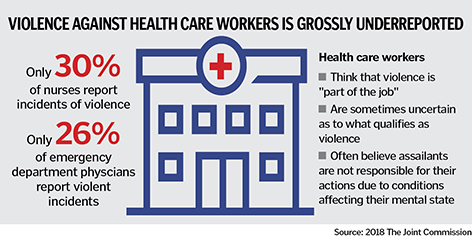
PeaceHealth is exploring how protocols implemented in hospitals to prevent infant abduction — including doors that lock automatically when infants are taken near an exit without their parent — could be used in off-site locations. The lockdown concept could be applied to preventing entry from outside in the case of civil unrest, protest or active shooter threats.
Towler noted that "with careful consideration to protect patient privacy and avoid unconscious bias, PeaceHealth can document incidents in the chart of a patient who has become violent at a PeaceHealth facility." He said this provides additional support for PeaceHealth clinicians to develop confidential, proactive care plans for those patients.
Alston said CHRISTUS is addressing the increasing threats by standardizing best security practices across its system. This includes encouraging security officers to be more visible and to engage with patients and visitors at its hospital and freestanding sites. CHRISTUS also is now ensuring all security officers have standard credentials as level III commissioned security officers cleared to carry weapons. CHRISTUS directly employs its security officers, who undergo psychological evaluation before they are hired.
Further reading:
Catholic Health World : "Health care executives unite to end assaults against staff"
Catholic Health World : "Our Lady of the Lake in Baton Rouge steps up safety efforts"
Catholic Health World : "Security officers are part of the care team at SSM Health"
Catholic Health World : "Providence deploys K9 unit to deter violence in hospitals, clinics"
Catholic Health World : "Hospitals act to keep staff safe from workplace violence"
Since a security threat can arise at any health system facility at any time, security experts from three ministry systems said it's important to involve all staff in security preparedness.
"High-risk situations can occur quickly, and preparedness can save your life," said Matthew Towler, system vice president of facilities and construction administration at PeaceHealth.
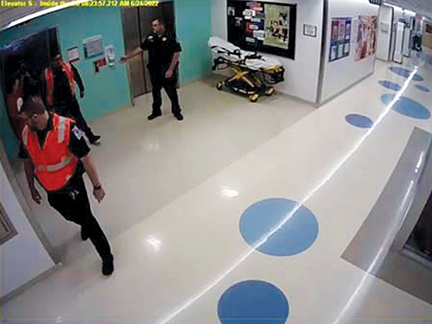
Roy E. Alston, vice president of security for CHRISTUS Health, said, "We accept that we cannot get rid of all risk, so we involve the associates as part of the (security) team. They have their eyes and ears on the campuses."
Alston said security is top of mind for CHRISTUS staff, especially in the aftermath of several mass shootings in recent months including a gunman's attack in June that killed four people and injured others in an outpatient building on the Saint Francis Hospital campus in Tulsa, Oklahoma.
CHRISTUS communicates with all staff members in all of its facilities on potential security threats. "Our training has been going on for several years, however, we've had the opportunity to reboot our training, making it more impactful and relatable to our associates and others in recent years," Alston said.
Laura Dewey, director of emergency management and safety for the Catholic Health system in Buffalo, New York, says, "In health care, we adapt and change based on need, and there has been an unarguable escalation in violence recently. Some of our associates expressed concerns after hearing about tragedies (recent shootings), so we listened and responded with new training based on that."
Run, hide, fight
Every few months CHRISTUS conducts active attacker training with all associates, and does so on an as-needed basis when leadership requests it. The sessions are tailored to each department's location, circumstances
and logistical considerations. In the sessions, security guards instruct staff on how to be aware of their surroundings and to use the "run, hide, fight" protocol if someone attacks them, with or without a weapon. Alston said CHRISTUS encourages
staff members to think through what their response would be to various types of assaults that they could be faced with and to talk with the security guards leading the instruction about how the associates should respond.
"We empower our teams to take their personal security seriously," Alston said. Among the advice the security officers deliver during training: associates should not let unknown people into their work areas and they should not let people without badges enter areas that require badges for entry.
Alston noted that much of the training focuses on how to respond with compassion when a patient or family members are agitated and tensions are ratcheting up. It is always important to attempt to de-escalate the situation, he said, and if a patient is experiencing an acute mental health episode, to get them the right resources "to help them heal."
Catholic Health has been mandating annual active shooter training for all its associates and offering additional training based on evolving needs. Dewey said after a May 14 mass shooting at a Buffalo grocery store, Catholic Health responded to heightened employee concerns about safety by creating a new training video for staff.
Developed with a retired emergency management professional from the New York State Department of Health's Office of Emergency Preparedness, the video demonstrates the run, hide, fight protocol. It's required viewing for all Catholic Health employees, and the system has trained managers at all its facilities to guide staff in practicing in their own departments what they've learned.
Quick drills
CHRISTUS has ramped up its active attacker trainings over the past year, using active shooter drills in both its inpatient and outpatient facilities. In these seven-minute exercises, security team members carry
out a mock attack. Afterward they offer a critique and point out missed opportunities to interrupt or escape an assailant. Patients and visitors are given the option to remain in the drill area as observers and then contribute to the discussion.
Alston noted there's been an emphasis on conducting the drills in outpatient offices.
He said of the drills, "We keep it sharp. Our (staff) are very busy." Not many employees can break from their work any longer than seven minutes. But, Alston said, that is not a detriment since most active attacker situations are over in a few explosive minutes. The rapid pace of training drills make participants aware of how fast dangerous situations can unfold and how many people could be killed or injured within minutes.
Elizabeth Mellon, CHRISTUS's director of HR strategy, noted that employee responses to survey questions on safety and security yield valuable actionable information. For instance, employees might report a broken lock on a door or a hallway that makes it accessible to outsiders when it should not be.
De-escalation
Towler said PeaceHealth trains its employees on active shooter scenarios and on techniques to prevent escalation of risky situations. Security and nursing staffs have gotten priority in the de-escalation training.
As violence in health care settings has increased, he noted, "There is a greater urgency to conduct the training for all (staff) since this type of incident is so unpredictable."
Towler said the training involves "the early identification of threats" and actions to prevent a situation from escalating. Participants learn methods to calm tempers and when to call a "Code Gray" for security assistance to head off violence.
Staff learns in the session the importance of listening intently to ascertain what a flustered or angry patient or family member is trying to communicate and how to offer solutions to address the issues. Instructors explain how clinicians can set boundaries and expectations for civil behavior on the part of patients and visitors. A staffer may say, "You cannot raise your voice or make threats. If you do, security will be called, and you may not get the help you are asking for." Staff are advised to be familiar with their environment and know the location of safe rooms and the best routes to use to get out in a crisis.
